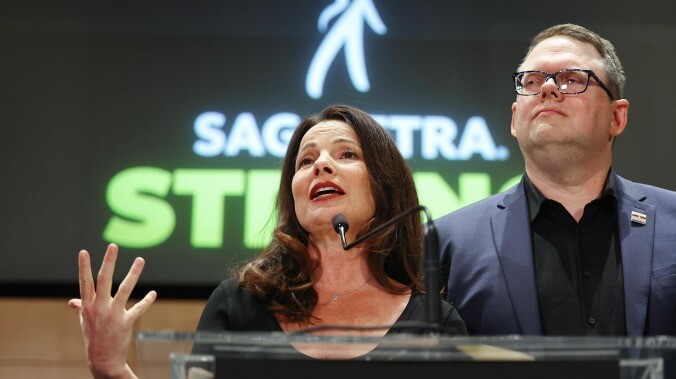Which raises a question: What’d they actually get? After burning all that shoe leather/Sharpie, what kind of deal has the union actually walked away from its bloody fight with SAG-AFTRA with? Union president Fran Drescher—who noted that the stress of negotiations led her to take more than one Zoom meeting from her bathroom—laid out some of the wins at press conferences this week with lead negotiator Duncan Crabtree-Ireland, now certainly Hollywood’s most famous Crabtree-Ireland.
According to Drescher, the new deal raises all SAG-AFTRA minimums by a fairly hefty 7 percent—and, probably more importantly, it also implements a “streaming residual bonus” expected to add up to about $40 million a year, which will go mostly to actors on streaming shows that break certain performance benchmarks, but with a quarter moving into a fund that will then be distributed to performers on less successful streaming series. The whole thing is built on a similar deal that the WGA carved out earlier this year, after it became clear that the big studios would probably let Hollywood burn to the ground before they’d start letting actors have direct profit sharing from their streaming subscriptions.
Meanwhile, the union also extracted some “guardrails” on the use of AI, although, somewhat critically, it still allows studios to create digital copies of people with their express permission. (Or their heirs, in the case of “zombie actors,” to use a phrase Crabtree-Ireland busted out yesterday.) Critically, there are some hefty protections in place against “synthetic actors” created by taking a bunch of people and mashing their scans together, which seems like a good step in not allowing all of media to get smooshed into some sort of perpetual digital dystopia.
And, hey! We know that’s all kind of heavy, so let’s close out with Fran Drescher saying some very Fran Drescher stuff, as she and her team celebrated the win: “We went to the press and said, ‘What are they doing? What are they waiting for? Are they trying to smoke us out?’ Well honey, I quit smoking a long time ago. So I think they finally realized they were facing a new kind of leadership in me and Duncan.”









































